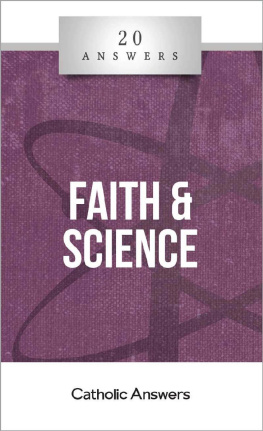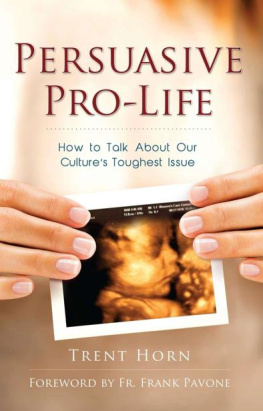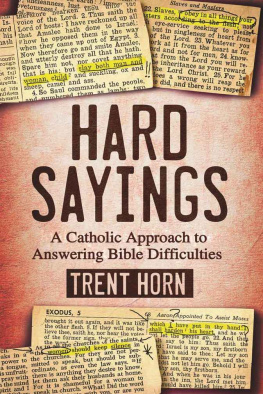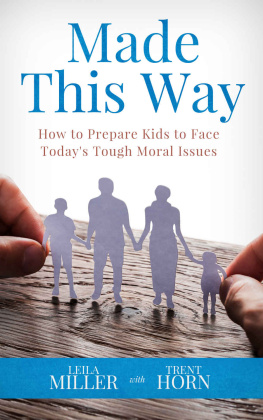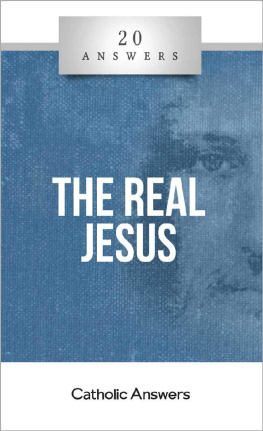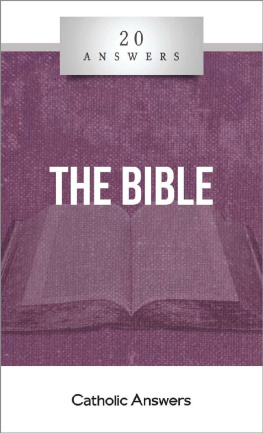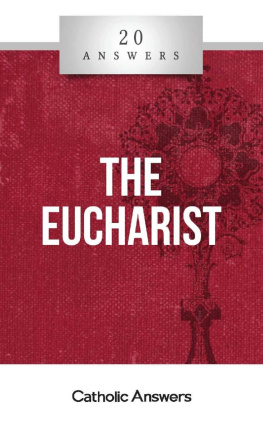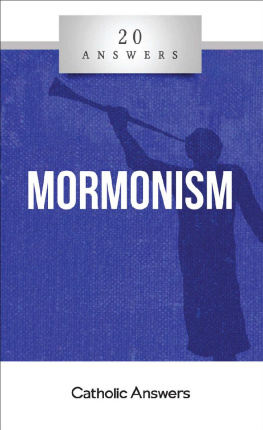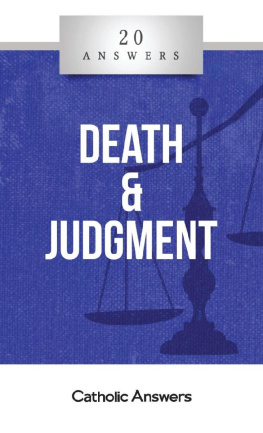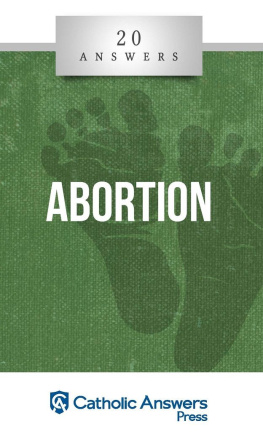Trent Horn - 20 Answers- Faith & Science
Here you can read online Trent Horn - 20 Answers- Faith & Science full text of the book (entire story) in english for free. Download pdf and epub, get meaning, cover and reviews about this ebook. year: 2016, publisher: Catholic Answers Press, genre: Religion. Description of the work, (preface) as well as reviews are available. Best literature library LitArk.com created for fans of good reading and offers a wide selection of genres:
Romance novel
Science fiction
Adventure
Detective
Science
History
Home and family
Prose
Art
Politics
Computer
Non-fiction
Religion
Business
Children
Humor
Choose a favorite category and find really read worthwhile books. Enjoy immersion in the world of imagination, feel the emotions of the characters or learn something new for yourself, make an fascinating discovery.
- Book:20 Answers- Faith & Science
- Author:
- Publisher:Catholic Answers Press
- Genre:
- Year:2016
- Rating:5 / 5
- Favourites:Add to favourites
- Your mark:
- 100
- 1
- 2
- 3
- 4
- 5
20 Answers- Faith & Science: summary, description and annotation
We offer to read an annotation, description, summary or preface (depends on what the author of the book "20 Answers- Faith & Science" wrote himself). If you haven't found the necessary information about the book — write in the comments, we will try to find it.
20 Answers- Faith & Science — read online for free the complete book (whole text) full work
Below is the text of the book, divided by pages. System saving the place of the last page read, allows you to conveniently read the book "20 Answers- Faith & Science" online for free, without having to search again every time where you left off. Put a bookmark, and you can go to the page where you finished reading at any time.
Font size:
Interval:
Bookmark:
20 Answers
Faith & Science
Trent Horn

20 Answers: Faith & Science
Trent Horn
2014 Catholic Answers
All rights reserved. Except for quotations, no part of this book may be reproduced or transmitted in any form or by any means, electronic or mechanical, including photocopying, recording, uploading to the Internet, or by any information storage and retrieval system, without written permission from the publisher.
Published by Catholic Answers, Inc.
2020 Gillespie Way
El Cajon, California 92020
1-888-291-8000 orders
619-387-0042 fax
catholic.com
Printed in the United States of America
ISBN 978-1-938983-87-0
ISBN 978-1-938983-88-7 Kindle
ISBN 978-1-938983-89-4 ePub
Table of Contents
Introduction
Didnt the Catholic Church ban science in the Middle Ages in order to protect the Faith? Wasnt Galileo tortured for proving the Church was wrong about the sun orbiting the Earth? Didnt Columbus bravely defy a Church that believed he would sail off the edge of a flat planet?
These and many other myths about the relationship between the Catholic Church and science are just that: myths. In fact, you can find the origins for many of them in two books written more than a hundred years ago: Andrew Dickson Whites A History of the Warfare of Science with Theology in Christendom (1896) and John Drapers History of the Conflict between Religion and Science (1874).
Today, historians have largely abandoned the conclusions reached by Draper and White, who promoted what is now called the conflict thesis, the belief that science and religion are at odds. In the book Science and Religion: A Historical Introduction , science historian Colin Russell writes, The conflict thesis, at least in its simple form, is now widely perceived as a wholly inadequate intellectual framework within which to construct a sensible and realistic historiography of Western science.... At different phases of their history, science and religion were not so much at war as largely independent, mutually encouraging, or even symbiotic.
Unfortunately, as Mark Twain said, A lie can travel halfway around the world while the truth is still putting on its shoes. The purpose of this booklet is to help the truth catch up to the lies about the Catholic Church and to show that there is no contradiction in worshipping the God who created the universe and in using science to explore and understand that creation.
1. Didnt the Catholic Church condemn science and as a result send us into the medieval Dark Ages?
According to this myth, after Christianity went from being a persecuted cult to being the official religion of the Roman Empire, the Catholic Church refused to tolerate the freethinking nature of pagan philosophers and scientists. Following St. Pauls exhortation to spurn the wisdom of the wise, Christians burned down the famous library of Alexandria and murdered the library directors daughter, an intelligent and beautiful pagan mathematician named Hypatia.
However, the evidence from history tells a different story about Hypatia and the library of Alexandria. According to Church historian Socrates of Constantinople, in A.D. 415 a mob in Alexandria did kill Hypatia, but it was because she was caught in a power struggle between St. Cyril, the bishop of Alexandria, and Orestes, the governor of Egypt. At that time, Alexandria contained large numbers of Christians, Jews, and pagans. Violent riots between these groups were common (see Acts 19:2940 for a description of a similar riot in Ephesus), and the uneasy relationship between St. Cyril and Orestes did little to quell them.
Socrates describes the murder of Hypatia at the hands of a mob led by a lector named Peter the reader. The mobs motive was to remove what seemed to be the only obstacle to Orestes and Cyrils reconciliation, that being Orestess friendship with Hypatia. While this episode reflects poorly on the character of some Alexandrian Christians, it is not indicative of a widespread attempt to silence pagan scientists. Science historian David Lindberg writes, [Hypatias] death had everything to do with local politics and virtually nothing to do with science.
What about the charge that fanatical Christians burned down the famous library of Alexandria, resulting in the loss of hundreds of thousands of classical works? All we know for certain about the library is that it was built in Egypt during the third or second century B.C. and was one of the largest libraries in the world. Although some, such as Carl Sagan in his book Cosmos, imply that a Christian mob burned down the library after the murder of Hypatia, there is no historical account prior to the eighteenth century that makes this accusation.
Indeed, the ancient primary sources describe the librarys being destroyed multiple times in the centuries prior to the murder of Hypatia. The first destruction came in 47 B.C. when Julius Caesar besieged Alexandria. According to the ancient historian Plutarch, [W]hen the enemy endeavored to cut off his communication by sea, he was forced to divert that danger by setting fire to his own ships, which, after burning the docks, thence spread on and destroyed the great library.The second destruction most likely came in A.D. 273 when the Roman emperor Aurelian invaded Egypt and burned most of the city of Alexandria to the ground.
Another part of this myth claims that after the librarys destruction, the Western world fell into the Dark Ages because the Church persecuted and suppressed scientific discovery. For example, Sagan asks why Western civilization slumber[ed] through a thousand years of darkness after the fall of Rome. He proposes the theory that science simply had no practical application for people, and so its practice fell into disfavor until Columbus and Copernicus rediscovered its usefulness in the sixteenth century.
But Sagan is wrong. Four hundred years before Copernicus and Columbus, the Catholic Church gave rise to the institution that became the primary source for knowledge in our modern world: the university. Beginning in Paris and Bologna in the year 1200, universities supported scholars like St. Thomas Aquinas, who developed a synthesis of classical Greco-Roman knowledge and Christian theology.
Within a few centuries, more than fifty universities sprang up throughout Europe, providing hundreds of thousands of students with unprecedented access to knowledge about science and history. According to science historian Michael Shank, If the medieval Church had intended to discourage or suppress science, it certainly made a colossal mistake in toleratingto say nothing of supportingthe university.
So why was there no apparent scientific progress between the fifth and thirteenth centuries? One reason is that Western civilization was still reeling from the destruction of the Roman Empire. With the loss of stability that followed the destruction of Rome, the Catholic Church became the protector of civilization. Monasteries across Europe copied what precious ancient manuscripts survived Romes fall, and this in turn preserved the history and collected knowledge of the past. In contrast to the idea that the Middle Ages represented intellectual stagnation, the eighth century saw the development of Carolingian miniscule.This new form of handwriting was simpler to learn and far easier to read, thus allowing more manuscripts to be copied. This included copies of ancient works discovered in the Middle East that helped spur the growth of scholastic thought in Europe during the late Middle Ages.
2. Did the Catholic Church teach that the Earth was flat?
Another popular myth claims that well into the Middle Ages Christians believed that the Earth was flat. Part of the legend even includes priests and other Christians warning Christopher Columbus that he should not tempt God by trying to sail around the world, since he would only fall off the edge of a flat Earth. But is this really what happened?
Next pageFont size:
Interval:
Bookmark:
Similar books «20 Answers- Faith & Science»
Look at similar books to 20 Answers- Faith & Science. We have selected literature similar in name and meaning in the hope of providing readers with more options to find new, interesting, not yet read works.
Discussion, reviews of the book 20 Answers- Faith & Science and just readers' own opinions. Leave your comments, write what you think about the work, its meaning or the main characters. Specify what exactly you liked and what you didn't like, and why you think so.

